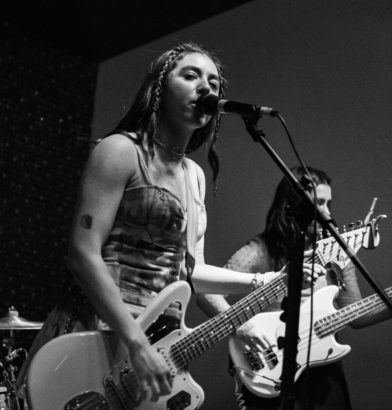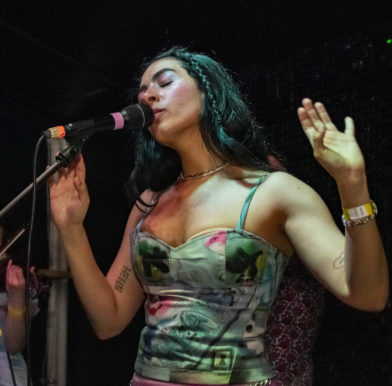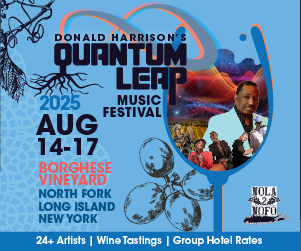OffBeat caught up with Mia Berrin of Pom Pom Squad before her show at Gasa Gasa on April 20. It’s part of her “Death of a Cheerleader’ tour supporting her critically-acclaimed album of the same name. She spoke about her quest to find belonging, her thoughts on representation in indie and punk music, and being unfairly labeled an industry plant.
What made you make the jump to move from Florida to Brooklyn?
I was born in Long Island. I was in Michigan and then moved to Orlando for the end of middle school and high school. I’ve always been really interested in art and music. I was sort of thrown into these communities that didn’t really value art that much. I’m very lucky my parents were always so encouraging of creativity in me and my siblings. But even though I had never really lived in the city, I felt like that was where my roots were in a way. So, I moved back to New York to study acting, actually.
 You’re a film buff. Is that where your interest in acting came from?
You’re a film buff. Is that where your interest in acting came from?
Potentially. I really value storytelling, how a song or movie or a show can really evoke a feeling of belonging or community. I think I never really felt like I belonged. When I would listen to music or watch a movie, I really reveled in the associations those things provide. The Virgin Suicides is one of my favorite movies and the soundtrack is all originals and it connected me to indie rock. And from there I became very interested in grunge. I was very much a product of the internet—I spent a lot of time clicking between Wikipedia pages. This director, these movies and these actors were in those bands or whatever, so I decided acting was for me. What I secretly wanted was to feel a sense of belonging. Being a woman of color in predominantly white neighborhoods and schools, I didn’t feel like I fit anywhere. When I was watching a movie, it felt like I fit somewhere. But I think ultimately what I love about movies is the ability for an artist to curate an entire experience through fashion design and through set design and through music, through art direction, through performance. That’s something I try to bring to Pom Pom Squad, this idea of creating a completely closed world.
Do you feel like you’ve found that place to belong? And if you did, where?
Oh, hell no. I think that probably the most valuable piece of advice I’ve ever received was from my mom. I went to this party when I first moved to New York, and I met all of these artists that I looked up to for a really long time. And I thought “When I meet these people, I’m finally going to feel like I belong”—but I didn’t. I cried to my mom on the phone, and she was like: “Stop trying to be friends with those people and start trying to be those people for someone else.” I adopted this ethos of I have to make this space instead of trying to fit into somebody else’s space. I haven’t found a sense of belonging necessarily, but I feel like I’ve met people and involved them in what I do—which makes it not necessarily like belonging as much as it is the creation of a community.
You have the larger sort of musical community within your genre and then the industry as a whole to fit in to. Do you think the larger industry has given you any sense of belonging?
Not really. I admire a lot of other bands and I think that there are beautiful communities. It’s like high school in a way. I was a loner in high school, and I sort of kept to myself. It’s hard for me to connect with people on a genuine level. And when I do, it’s really special. There are a lot of cliques that exist, like indie rock, and I am kind of an onlooker. I don’t necessarily feel at home.
What are your thoughts on punk as a genre and where it’s at today? Especially with it being a largely white, male-dominated kind of music.
I think the thing that initially attracted me to punk is that it felt accessible in a way that a lot of other genres didn’t. There’s sort of a barrier to entry in a lot of genres. Sort of like high school, there’s a “jazz” band. And jazz obviously involves a level of relationship that takes years of training—it felt very inaccessible. In modern pop music, being an artist and a producer is the recommended way to be able to get what you want.
With punk, it was like you could make DIY music and it would be edgier. All I had to do was to plug in my guitar into an interface or record through my laptop and make something new on GarageBand. And that felt very intuitive, and it also felt private. I wasn’t learning in front of anyone. It was also a good way to express my anger. There’s not really space to be angry. And I think when I was first introduced to Riot grrrl, it really was my first introduction to my anger having a value. I was obsessed with Riot grrrl. But I sort of looked more into it, and I realized that Riot grrrl really failed women of color.
That’s gotta be a unique experience as a person of color.
I think it’s sort of like everything has changed but nothing has changed. There’s a lot more representation than there was when I was younger. I can name 20 women off the top of my head in my life who play bass, for example. Whereas when I was a teenager in my hometown, I didn’t know a single girl who played bass. There was no queer community around me, and not a lot of people of color around me. And if there was, they weren’t interested in music because historically we haven’t really been allowed to engage with punk. Black people started most forms of popular music, but it has been co-opted by the industry. Every facet of everything became very white because it would sell to a white audience. So, by the time I was in high school trying to get into indie rock, I was suddenly involved in something I probably shouldn’t have been. It was normal to not see a single person that looked like me. But that’s a very positive thing about the internet, especially in the last couple of years. There has been a bigger emphasis on non-men and different people being into indie rock.
Have there been people you’ve met or learned about since starting out with Pom Pom Squad who were like you?
Yeah, definitely. And that’s been really exciting—to meet women of color and queer people of color who make music. The internet has been a huge part of the discovery.
 I didn’t see a lot of people of color, or queer people in bands either.
I didn’t see a lot of people of color, or queer people in bands either.
The thing that I realized is that it’s not that it didn’t exist. It existed in a galaxy of separate bedrooms. People like me who were making art but not telling anybody. It’s really beautiful how that has sort of started to leave those bedrooms and be connected to each other. There are a lot of people who are younger than me, who will come to me and be like, “I started playing guitar because of your band.” And it’s not a huge band but if somebody could find me and that made them want to play guitar, that’s amazing. And imagine how many other bands might be having those conversations.
You worked with Sarah Tudzin who produced Death of the Cheerleader. How did that relationship come about?
I wrote a demo for Death of a Cheerleader during the pandemic when I was at home, and I wrote the arrangements and knew what I wanted out of the record. I went to school for production and engineering. And it’s a muscle I hadn’t tried yet and I knew what I wanted out of the record wasn’t totally matched to my skill level. I wanted to find someone who was really technically bound. Sarah Tudzin put out the record Free IH and I listened to it and really loved it. And there’s a lot of style and I could hear it sitting nicely within the record. So, I reached out to her, and we had a lot of the same pace and references in terms of the concept. We ended up creating something very lush and Motown that also still fit in the world of a grunge-pop record. She trusted my ideas and we both made something we’re really proud of.
The cover of the Nada Surf song “Popular” is such a whiny, teenage dude song. You were able to recreate it and its music video from the perspective of a woman.
It’s sort of funny—like all it takes is me singing a song to change the perspective. It’s interesting in a way because I do sort of love faithful recreations of the things that I love. And it’s funny how little it takes to change the context of what it is. For the Nada Surf song “Popular” all I had to do is just put my own body in the place of a white person’s body and sing the song. It’s so easy to take something that to you was a whiny boy song and now it’s something else because I’m singing it. And that’s sort of the point, in a way, of why I do what I do.
People ask me how being a person of color influences my songwriting and I can’t tell you because it’s like the only lens that I’ve been given. I’ve never explicitly written a song about being a woman, about being a person of color.
Everyone is staking their claims over their small corner of the world. And I get it. You have to establish yourself in some way. There is this scarcity mentality in indie music, especially where it sort of seems like there’s so little room for people to break through. But turns out there’s a lot of room for everybody, which is really exciting. And the way to do that is by kind of subverting art.
Do you ever get worried that you’ll be called a sellout?
There is such an oversaturation of music it can be hard to stand out. I forgot who said it, but somebody was like “Doesn’t selling out just mean everybody bought a ticket?” I just don’t think there’s any shame. I get the industry plant comments. I think what it means when someone says you’re an industry plant is that you have a clear, defined vision. It looks expensive. It sounds expensive. But I’m just really detail-oriented and I really want everything to be how I want it to be, and I do what it takes to get that. People want to be judgey because I’m wearing a cool pair of shoes or singing my little song.



